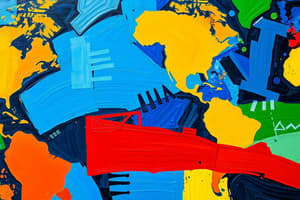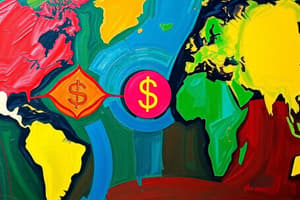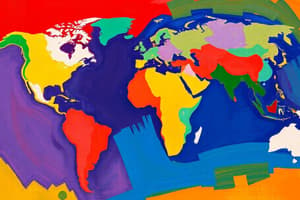Podcast
Questions and Answers
Which of the following best describes the 'Cycles Theory' of globalization's origin?
Which of the following best describes the 'Cycles Theory' of globalization's origin?
- Globalization is primarily driven by political ideologies and international relations.
- Globalization is a linear progression that continuously accelerates over time.
- Globalization has occurred in recurring patterns throughout history. (correct)
- Globalization is a recent phenomenon tied to advancements in technology and communication.
Which event represents ancient globalization?
Which event represents ancient globalization?
- The Roman Empire's expansion. (correct)
- The founding of the Internet.
- The voyages of Christopher Columbus.
- The first transatlantic telephone cable.
Which of the following is a primary characteristic of the modern world that facilitates globalization?
Which of the following is a primary characteristic of the modern world that facilitates globalization?
- Reduced cultural exchange between countries.
- Technological advancements in communication and transportation. (correct)
- A decline in international trade agreements.
- Increased isolationism among nations.
According to Manfred Steger's core claims of globalism, what role does conflict play in globalization?
According to Manfred Steger's core claims of globalism, what role does conflict play in globalization?
What is a likely outcome of the trend toward regionalization in the future of globalization?
What is a likely outcome of the trend toward regionalization in the future of globalization?
How does economic globalization affect wealth distribution among countries and corporations?
How does economic globalization affect wealth distribution among countries and corporations?
Which of the following is a key function of international financial institutions in the context of economic globalization?
Which of the following is a key function of international financial institutions in the context of economic globalization?
How do multinational corporations contribute to economic globalization?
How do multinational corporations contribute to economic globalization?
What is a primary challenge faced by the United Nations (UN) in addressing global political conflicts?
What is a primary challenge faced by the United Nations (UN) in addressing global political conflicts?
Dependency theory suggests that developing nations may face which of the following challenges in the context of political and economic imbalances?
Dependency theory suggests that developing nations may face which of the following challenges in the context of political and economic imbalances?
Flashcards
What is Globalization?
What is Globalization?
Growing interdependence of economies, cultures, and populations across borders, driven by trade, technology, investments, migration, and communication flows.
Economic Globalization
Economic Globalization
Countries are interconnected through trade, investments, and production processes.
Geographical Globalization
Geographical Globalization
Societies are becoming more integrated despite physical borders due to increased interactions.
Technological Globalization
Technological Globalization
Signup and view all the flashcards
Hardwired Theory (Globalization)
Hardwired Theory (Globalization)
Signup and view all the flashcards
Cycles Theory (Globalization)
Cycles Theory (Globalization)
Signup and view all the flashcards
Ancient Globalization
Ancient Globalization
Signup and view all the flashcards
Economic Globalization
Economic Globalization
Signup and view all the flashcards
International Trade Systems
International Trade Systems
Signup and view all the flashcards
Global Corporations (MNCs)
Global Corporations (MNCs)
Signup and view all the flashcards
Study Notes
- Globalization refers to the increasing interdependence of economies, cultures, and populations across borders.
- Globalization is driven by trade, technology, investments, migration, and communication flows.
Key Aspects of Globalization
- Economic Globalization involves countries being interconnected through trade, investments, and production.
- Geographical Globalization involves societies becoming more integrated despite physical borders.
- Technological Globalization involves the internet and digital advancements making the world more connected.
Why Study Globalization
- Studying globalization provides economic and business insights, aiding understanding of trade, market integration, and investments.
- It fosters technological adaptation by understanding digital advancements and global connectivity.
- It promotes political and legal awareness through learning about global policies and governance.
- It helps in cultural understanding by examining cultural exchange and migration trends.
- Studying globalization assesses how it impacts the environment, promoting environmental responsibility.
Theories on the Origin of Globalization
- The Hardwired Theory (Nayan Chanda, 2007) suggests that humans have always sought to improve their lives by trading and connecting.
- The Cycles Theory (Scholte, 2005) posits that globalization occurs in cycles and has repeated throughout history.
Epochs of Globalization
- Globalization of Religion (4th-7th Century) was an early phase.
- European Colonial Conquest (Late 15th Century) marked a significant period.
- Intra-European Wars (18th-19th Century) influenced globalization.
- The Heyday of European Imperialism (1918) was a key epoch.
- Post-World War Globalization followed.
- Post-Cold War Globalization is a more recent phase.
Major Historical Events in Globalization
- Ancient Globalization involved Roman Conquests expanding trade and culture.
- Genghis Khan's Empire connected Asia and Europe.
- Christopher Columbus (1492) discovered America.
- Vasco da Gama (1498) opened trade routes to India.
- Ferdinand Magellan (1522) was the first to circumnavigate the globe.
Modern Technological Advances
- The first transatlantic telephone cable in 1956 enhanced communication.
- The first transatlantic television broadcast in 1962 marked progress in media.
- The founding of the internet in 1988 revolutionized connectivity.
- The 9/11 terrorist attack in 2001 affected global security policies.
Epochs of Globalization
- The Silk Road (1st Century BC – 5th Century AD, 13th-14th Century AD) connected China, India, the Middle East, and Europe through trade.
- The Spice Routes (7th-15th Century) connected Asia, Africa, and Europe.
- The Age of Discovery (15th-18th Century) saw European exploration leading to colonization and expansion of trade networks.
- The 1st Wave of Globalization (19th Century – 1914) involved the Industrial Revolution and global trade expansion.
- World Wars in the 20th Century disrupted globalization but also led to new economic policies.
- The 2nd & 3rd Wave of Globalization (Post-WWII - Present Day) is driven by technology, diplomacy, and finance.
- Globalization 4.0 (Present & Future) is characterized by the rise of the digital economy, artificial intelligence, and automation.
Characteristics of the Modern World
- Globalization connects the world through trade, communication, and technology.
- Technological Advancement has revolutionized business, communication, and education.
- Urbanization involves more people moving to cities for better opportunities.
- Diversity & Multiculturalism sees societies becoming more ethnically and culturally diverse.
- Environmental Awareness has countries focusing on sustainability and climate change.
- Political Complexity involves global political issues like human rights and security becoming more important.
Types of Globalism (Manfred Steger, 2009)
- Market Globalism advocates for free markets and capitalism.
- Justice Globalism pushes for fair trade, human rights, and sustainability.
- Religious Globalism aims to create a global religious influence over secular societies.
Six Core Claims of Globalism (Manfred Steger)
- Globalization promotes free markets and economic liberalization.
- Globalization is inevitable and irreversible.
- Nobody controls globalization.
- Globalization benefits everyone (in the long run).
- Globalization spreads democracy worldwide.
- Globalization requires a global war on terror.
Trends Shaping the Future
- Digitalization includes AI, blockchain, and automation increasing digital trade.
- Sustainability involves businesses focusing on eco-friendly policies and fair labor practices.
- Regionalization sees countries shifting to regional trade agreements instead of global markets.
- Geopolitical Rivalries involve U.S.-China tensions impacting global trade and economic policies.
- Economic Resilience involves governments strengthening local industries to reduce reliance on global supply chains.
Economic Globalization
- Economic Globalization refers to the increasing interdependence of world economies.
- Cross-border trade of commodities and services is a component
- International capital flows happen because of it
- Rapid spread of technologies occurs as a result
Key Benefits of Economic Globalization
- It promotes economic growth by expanding markets, boosting production, and increasing trade opportunities.
- It creates jobs by encouraging investments, leading to business expansion and employment.
- It facilitates technology sharing, enhancing innovation through global collaboration.
- It expands consumer choices, providing access to a wider variety of goods and services.
- It encourages international cooperation, strengthening global partnerships and economic alliances.
Challenges of Economic Globalization
- Increased competition boosts productivity but pressures local businesses.
- Global interdependence makes economies vulnerable to global crises.
- Wealth inequality benefits large economies and corporations more than smaller ones.
- Cultural exchange promotes diversity but can threaten local traditions.
- Environmental impact, increased production and transportation can harm the environment.
Key Components of Economic Globalization
- International Trade Systems are frameworks regulating commerce, such as WTO, EU, and ASEAN.
- International Financial Institutions include IMF, World Bank, and central banks that provide financial stability.
- Global Supply Chains & Production Networks coordinate production across countries to enhance efficiency.
- Global Financial Markets are platforms for cross-border capital movement, including stock markets, forex, and bond markets.
Examples of Global Supply Chains
- Apple Products are designed in the US, assembled in China, with components from Japan and Korea.
- Samsung Electronics are designed in South Korea, assembled in Vietnam and India, with semiconductors from Taiwan and lithium from Australia.
Ideology of Economic Globalization
- Economic Globalization promotes a free-market world with minimal government restrictions.
- Globalization is inevitable and irreversible.
- Nobody is in charge of globalization.
- Globalization benefits everyone in the long run.
- Globalization furthers democracy worldwide.
- Economic and political freedom are interconnected.
Market Globalism Perspective
- Market Globalism advocates for fewer business restrictions and increased opportunities.
- It views globalization as a natural and unstoppable process.
- It believes no entity controls globalization.
- Market Globalism highlights the benefits of international trade and competition.
- It encourages foreign direct investment (FDI).
Challenges of Market Globalism
- Job losses & low wages occur as companies relocate to countries with cheaper labor.
- Environmental degradation increases as production harms the environment.
- Erosion of local cultures can lead to the loss of traditional practices and identities.
Economic Relations and Their Types
- Economic relations include trade, investment, and financial interactions among countries, businesses, and individuals.
Types of Economic Relations
- Bilateral relations are trade agreements between two countries.
- Multilateral relations are trade agreements involving three or more countries.
- Regional relations are trade agreements among neighboring countries.
- Global relations are trade relations connecting all countries.
Impact of Economic Relations
- Economic Growth & Job Opportunities occur through trade and investments
- Provides Access to More Markets & Resources to countries that cannot produce locally
- Increases Consumer Choices through more variety at competitive prices
Cons of Economic Relations
- Dependence on Stronger Economies- Weaker nations rely too much on powerful countries.
- Labor Exploitation & Environmental Harm- Poor working conditions and pollution.
- Trade Imbalances occur as Imports exceed exports, creating economic instability.
Role of Global Corporations in Economic Globalization
- Multinational corporations (MNCs) operate in multiple countries to expand business and influence international markets.
Characteristics of Global Corporations
- An Extensive Global Presence operates in multiple countries.
- Diversified Operations engage in manufacturing, sales, and services worldwide.
- Large-Scale Investment contributes to foreign direct investment (FDI).
- Advanced Supply Chains utilize complex networks for efficiency.
Economic Contributions of Global Corporations
- Trade Expansion involves producing and selling goods internationally.
- Foreign Direct Investment (FDI) involves investing in infrastructure and industries in developing economies.
- Employment Opportunities provide millions of jobs worldwide.
Challenges & Ethical Concerns for Global Corporations
- Labor Rights Issues involve companies outsourcing to low-wage countries with poor working conditions.
- Environmental Impact involves pollution and resource depletion.
- Corporate Social Responsibility (CSR) has companies adopt sustainable practices to address these concerns.
Conclusion of Economic Globalization
- This has increased interdependence among national economies through trade systems, financial institutions, supply chains, and labor migration.
- It promotes growth and economic integration, but presents challenges such as inequality, environmental damage, and exploitation.
- Balancing economic progress and social responsibility remains a key issue.
Political Globalization
- Refers to the increasing internationalization of political decisions and activities.
- It diminishes the role of national borders.
- It increases rise of global governance structures.
- It increases interaction governments and external interventions.
- It increases the influence of democracy, NGOs, human rights, and freedoms on global policies
Key Aspects of Political Globalization
- Political Integration involves establishing global political laws and principles.
- Transnational Activism is the rise of global movements advocating for change.
- International Norms are the development of shared global standards.
- It includes increased ease of movement & trade as there is increased cross-border cooperation
Challenges of Political Globalization
- There is a loss of National Sovereignty as Diminished power of individual states.
- There is an increased Bureaucracy as a result of Complex global governance structures.
- Decreased Political Accountability- Power shifts away from elected national leaders.
Key Elements of Global Political Systems
- Nation-State- A Defined territory, government, population, and sovereignty.
- International Relations is the Interaction of states and NGOs in politics, economics, and security.
The Role of the United Nations (UN)
- The UN was founded in 1945 and consists of 193 member states
- Its main purposes are Maintaining global peace and security, Developing friendly international relations, Promoting human rights and development, and Harmonizing international cooperation
Main Organs of the United Nations
- General Assembly- Main policymaking body, requires a majority vote for decisions.
- Security Council- Maintains international peace, has 15 members (5 permanent, 10 non-permanent).
- Economic & Social Council Handles global economic, social, and environmental issues.
- International Court of Justice (ICJ) Settles legal disputes between nations.
- Secretariat Oversees UN operations, led by the Secretary-General.
- Trusteeship Council- Provided international supervision for Trust Territories (suspended in 1994).
Functions of the UN
- Peace & Security- Peacekeeping missions and conflict resolution.
- Human Rights Protection- Advocating global freedoms and rights.
- Economic & Social Development Providing aid and poverty reduction programs.
- International Law Establishing legal frameworks for global cooperation.
- Environmental Sustainability Addressing climate change and global development.
Challenges Faced by the UN
- Lack of Enforcement Power Relies on voluntary cooperation from member states.
- Security Council Veto Power Some nations (e.g., Russia, China) block resolutions.
- Ineffectiveness in Conflicts Examples include Iraq, Syria, and Kosovo interventions.
Global Political Conflicts & UN Responses
- Kosovo War (1999) NATO intervened despite UN inaction due to Russian and Chinese vetoes.
- Syrian Civil War- UN failed to act decisively due to Russian vetoes.
- Iraq War (2003) UN opposed U.S. intervention, which proceeded without authorization.
Regionalism & Globalization
- Regionalism refers to countries forming political or economic alliances based on geography.
Phases of Regionalism
- Cold War Era (1947–1991): Marked by ideological division (capitalism VS. communism), proxy wars, and nuclear deterrence.
- Post-Cold War Era (1991-Present): Shift from state conflicts to non-state threats (e.g., terrorism, climate change).
Global Poverty & Political Inequality
- Poverty is influenced by economic, social, political, and cultural factors.
- Developed nations (North) have more influence over global politics than developing nations (South).
Political and Economic Imbalances
- Dependency Theory- Developing nations rely on exports while importing expensive goods, limiting local industrial growth.
- Unfair Trade Policies- Free trade benefits stronger economies, while weaker ones face market barriers.
- Debt Burdens IMF/World Bank loans increase poverty by cutting social services.
- Foreign Aid Issues Aid dependency can discourage self-sufficiency and local entrepreneurship.
Reforming Global Political Systems
- Equitable Representation in International Institutions is needed to reduce the dominance of developed nations in global governance.
- Sustainable Development Goals (SDGs) are used to address poverty, inequality, and climate change.
- Fair Trade Practices are promoted to ensure fair pricing for developing nations.
- Debt Relief Programs help reduce financial burdens on struggling economies.
- Empowering Local Communities promotes self-sufficiency and local governance.
- Political globalization has reshaped governance, shifting power from individual states to international organizations.
- While it promotes cooperation, peace, and human rights, it also challenges national sovereignty and accountability.
- Balancing global governance with state autonomy remains a crucial issue in modern politics.
Studying That Suits You
Use AI to generate personalized quizzes and flashcards to suit your learning preferences.




